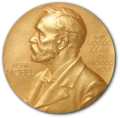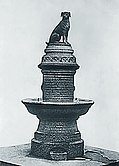Wikipedia:Selected anniversaries/December 10
This is a list of selected December 10 anniversaries that appear in the "On this day" section of the Main Page. To suggest a new item, in most cases, you can be bold and edit this page. Please read the selected anniversaries guidelines before making your edit. However, if your addition might be controversial or on a day that is or will soon be on the Main Page, please post your suggestion on the talk page instead.
Please note that the events listed on the Main Page are chosen based more on relative article quality and to maintain a mix of topics, not based solely on how important or significant their subjects are. Only four to five events are posted at a time and thus not everything that is "most important and significant" can be listed. In addition, an event is generally not posted this year if it is also the subject of the scheduled featured article or picture of the day.
To report an error when this appears on the Main Page, see Main Page errors. Please remember that this list defers to the supporting articles, so it is best to achieve consensus and make any necessary changes there first.
Images
Use only ONE image at a time
-
Alfred Nobel
-
Alfred Nobel
-
Nobel Prize
-
Selma Lagerlöf
-
Wallis Simpson
-
Calbraith Perry Rodgers
-
Edmond Halley
-
Raúl Alfonsín
Ineligible
| Blurb | Reason |
|---|---|
| ; Constitution Day in Thailand (1932) | refimprove sections |
| 1799 – France became the first country to adopt the metric system as its system for weights and measures. | missing information |
| 1868 – The first traffic lights were installed outside the Houses of Parliament in London, resembling railway signals with semaphore arms and red and green gas lamps for night use. | multiple issues |
| 1896 – Alfred Jarry's play Ubu Roi made its only performance in Paris at the Théâtre de l'Œuvre, infamously causing a riotous response in the audience. | refimprove section |
| 1909 – Swedish author Selma Lagerlöf became the first woman to be awarded the Nobel Prize in Literature. | lots of CN tags (8) |
| 1948 – The United Nations General Assembly adopted the Universal Declaration of Human Rights, representing the first global expression of rights to which all human beings are inherently entitled. | external links |
| 1968 – Japan's biggest heist, the still-unsolved "300 million yen robbery", occurred in Tokyo. | no footnotes |
| 1978 – Starring Christopher Reeve in the title role, Superman, the first big-budget Superman film, premiered in Washington, D.C. | refimprove section |
| Melvil Dewey |b|1851| | too many {cn} tags (9) |
Eligible
- 1508 – The Papal States, France, Aragon and the Holy Roman Empire formed the League of Cambrai, an alliance against the Republic of Venice.
- 1861 – Militia forces led by Nguyễn Trung Trực, an anti-colonial leader in southern Vietnam, sank the French lorcha L'Esperance.
- 1884 – Adventures of Huckleberry Finn by American author Mark Twain was first published in the United Kingdom and Canada, two months earlier than in the US.
- 1898 – The Spanish–American War ended with the signing of the Treaty of Paris, with Spain recognizing the independence of Cuba and ceding Guam, the Philippines, and Puerto Rico to the United States.
- 1901 – The first Nobel Prizes were awarded, on the anniversary of the 1896 death of their founder, Swedish chemist and industrialist Alfred Nobel.
- 1911 – Calbraith Perry Rodgers completed the first transcontinental flight across the United States.
- 1936 – Edward VIII, desiring to marry the American socialite Wallis Simpson against widespread British opposition, signed the instrument of abdication to renounce the throne in favour of his brother George VI.
- 1942 – Edward Raczyński of the Polish government-in-exile issued a note that was the first official report on the Holocaust.
- 1983 – Raúl Alfonsín became the first democratically elected president of Argentina to take office after more than seven years of military dictatorship.
- 1989 – At the first open pro-democracy demonstration in Mongolia, journalist Tsakhiagiin Elbegdorj announced the formation of the Mongolian Democratic Union, which would be instrumental in ending communist rule four months later.
- Born/died this day: | Michael IV the Paphlagonian |d|1041| Nikephoros III Botaneiates |d|1081| Stede Bonnet |d|1718| María Bibiana Benítez |b|1783| Caroline Mehitable Fisher Sawyer |b|1812| C. Rajagopalachari |b|1878| Harold Alexander, 1st Earl Alexander of Tunis |b|1891| Ann Gloag |b|1942| Diane Schuur |b|1953| Abdullah Yusuf Ali |d|1953| Sultan Kösen|b|1982| Vladimir Teplyakov |d|2009| Ziad Abu Ein |d|2014
Notes
- 1983 Argentine general election appears on October 30, so Raúl Alfonsín should not appear in the same year
- Alfred Nobel appears on November 27, so Nobel Prize should not appear in the same year
- 1684 – Edmond Halley presented the paper De motu corporum in gyrum, containing Isaac Newton's derivation of Kepler's laws from his theory of gravity, to the Royal Society.
- 1768 – The first edition of the Encyclopædia Britannica was released in Edinburgh.
- 1907 – During the Brown Dog affair, protesters marched through London and then clashed with police officers in Trafalgar Square over the existence of a memorial (pictured) for animals that had been vivisected.
- 1941 – Second World War: Imperial Japanese Navy torpedo bombers sank the Royal Navy capital ships HMS Prince of Wales and HMS Repulse east of Malaya.
- 1979 – The Kuomintang dictatorship of Taiwan arrested a large number of opposition leaders who had organized pro-democracy demonstrations, an incident credited with ending the party's rule in 2000.
- Ignatius Behnam Hadloyo (d. 1454)
- Isaac Beeckman (b. 1588)
- Jasuben Shilpi (b. 1948)








